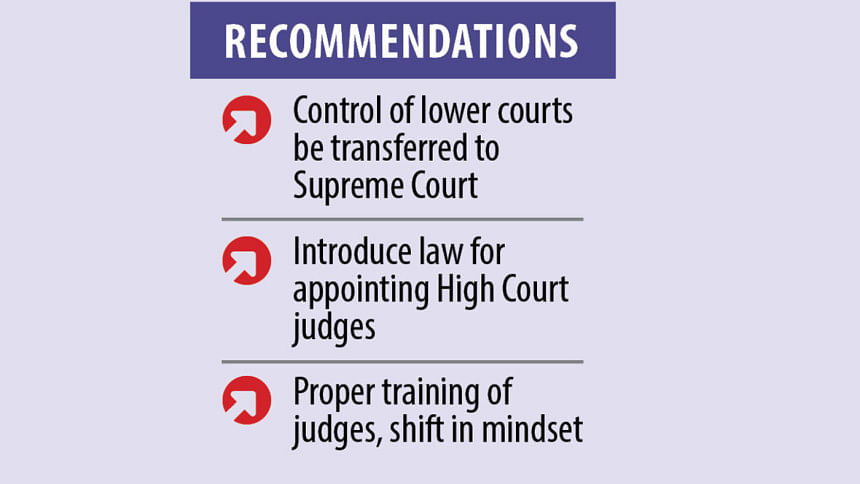Appointment of HC judges must be transparent

A panel of legal experts and activists yesterday called for transparency in the appointments of High Court judges and stressed the need to ensure that judges can carry out duties freely.
The speakers also highlighted the erosion of democratic culture and the consequent decline of judicial independence over the past 15 years, emphasising the importance of a judiciary free from political influence in ensuring justice for all citizens.
They made the remarks during an event titled "Uprising and Legal Reform: Independence of the Judiciary," held at The Daily Star Centre. This was the second instalment in The Daily Star's series of discussions on constitutional issues.
Speaking at the discussion, Additional Attorney General Anik R Haque said judges need to understand the distinction between hate speech and constructive criticism, terming them opposing concepts.
"This requires both a proper training of judges and a shift in their mindset."
Haque also opined that, aside from other parties involved, lawyers bear some responsibility for the backlog of cases and delays in the judicial process under the current system.
Tanim Hussain Shawon, a Supreme Court lawyer and a member of the newly-formed Judiciary Reform Commission, emphasised the court's counter-majoritarian role in protecting citizens from the state.
"Over the years, we've seen how this role has eroded. The erosion of democratic culture is directly proportional to the Supreme Court. When democracy backslides, so does the judiciary. One acts as a catalyst for the other."
He further blamed the higher court for contributing to the lack of democracy in the country over the past 15 years.
"When the higher court is politically controlled, how can we expect the lower courts to stand strong?" he asked.
Shawon added that if control of the lower courts were transferred to the Supreme Court, the judiciary could function independently.
"Sheikh Hasina's government first politically manipulated the Supreme Court, and the lower courts naturally followed suit. These are our past experiences."
He mentioned that he would convey the broader concerns and expectations of all stakeholders to the commission.
Barrister Rumeen Farhana, a former lawmaker and the assistant secretary of the BNP's international affairs, said the judiciary cannot be strong when the country is governed by ill politics and politicians.
She said the judiciary, like other important institutions, has been destroyed.
She added that although the judiciary has deteriorated over the last 15 years, the process started at the birth of Bangladesh.
"The constitution has been amended by every government to suit their own agenda…"
Saying the judiciary has been corrupted by politics and money, she blamed lawyers for failing to implement the decentralisation of the higher courts.
To address these issues, Rumeen made several recommendations, including establishing a separate secretariat for the judiciary, enacting a distinct policy for judge postings, introducing a law for appointing High Court judges, and providing a separate budget for the judiciary.
Writer and activist Firoz Ahmed called for reforms in the police, public administration, and prison systems.
"Police are a vital part of the judiciary. If the police aren't reformed, the judiciary will not be independent," he added.
In his welcome speech, The Daily Star Editor and Publisher Mahfuz Anam said the newspaper's editorial stance is that laws are the invisible infrastructure of society.
"We are advocating for the independence of the judiciary because we want justice... The goal of judicial reforms should be to ensure justice for all."
Anam added that when the judiciary is free from political and party influence, an environment is created that allows it to function independently, ensuring that people receive justice.
The event, moderated by constitutional expert Arif Khan, was addressed by speakers including Dhaka University Law Department lecturer Psymhe Wadud, Supreme Court Advocate MM Khalekuzzaman, Barrister Asaduzzaman Fuad, constitutional researcher Snehardi Chakrabarty, Assistant Professor of Law at Bangladesh University of Professionals Emraan Azad, Assistant Professor of Law at Dhaka International University Imtiaz Ahmed Sajal, writer-researcher Kajal Rashid Shahin, and Jagannath University student Khadijatul Kubra, among others.

 For all latest news, follow The Daily Star's Google News channel.
For all latest news, follow The Daily Star's Google News channel. 



Comments